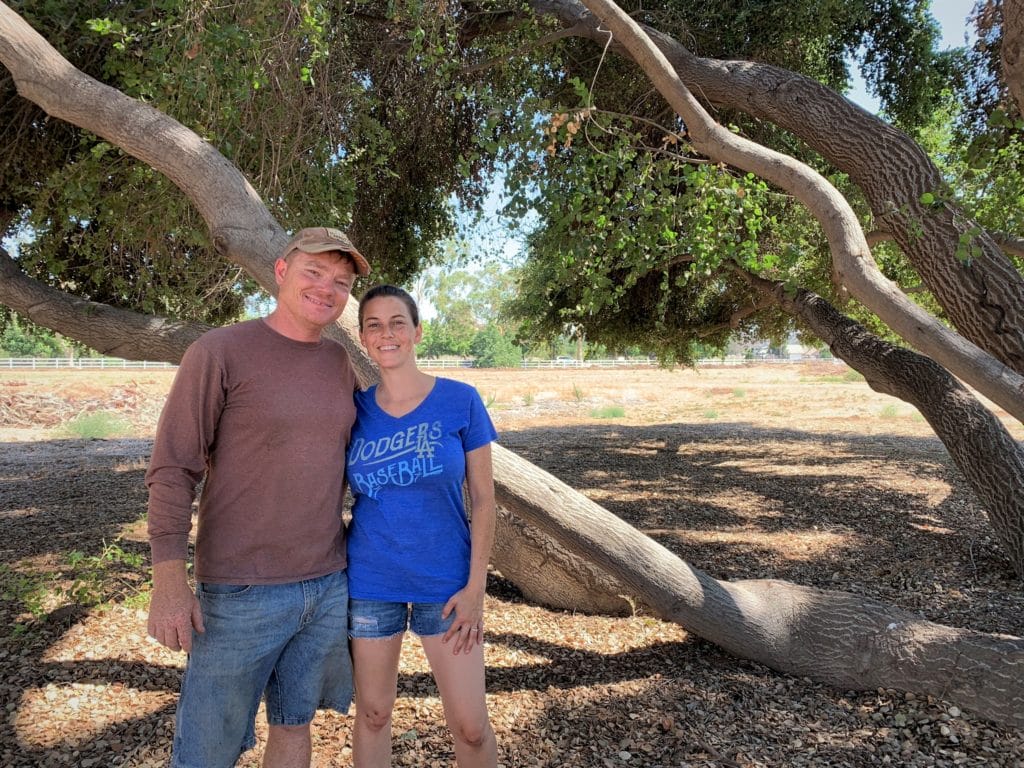SES Alumna Plants Seeds of Hope on a Farm

Sometimes a single action can foretell the future.
For Kara Unger (Teacher Education, ’07), a “light bulb moment” happened when she and her husband Erik noticed their 19-year-old son Joshuah planting seeds in the garden bed of their yard. Joshuah had been diagnosed with severe autism at the age of 3 and is primarily non-verbal.
“He can use one- and two-word utterances to communicate his wants and needs,” Unger says, “but he’s always been in classes through the district for severely disabled kiddos. Josh had just recently taken up this interest in planting seeds and watching them grow, of course, with lots of assistance. It was something that he was just really into. And the idea just grew from there.”
That idea was to create the non-profit Gable Farms, a “concept in progress” for the Unger family as they establish themselves as part of the community of Riverside, California.
Located in the city’s historic greenbelt area, the seven-acre farm will serve as a working day-program for adults, like Joshuah, with cognitive disabilities such as cerebral palsy and Down syndrome and who usually struggle to find positions in the job market.
As a parent, says Kara Unger, “you want everything for your child, and if it’s anything less than everything, it’s not enough.”
Opportunities at Gable Farms will allow the adults to explore a variety of passions, including gardening, animal care, wood-working, and cooking.
Unger says that the couple’s vision for Gable Farms is to offer career paths, a place where these adults can develop job skills in areas of their interest and choice as they learn to create and sell the products that they’ve farmed and made.
That’s why the couple decided not to call their operation Unger Farms–not only does the farmhouse have a prominent gable roof, Unger explained, she likes that the word “gable” contains “able,” which sends a positive message to visitors.
“As a parent, you want everything for your child, and if it’s anything less than everything, it’s not enough,” she says. “Even though I didn’t specifically think with direction about what my kid would be doing, it’s always been there. Ever since his diagnosis, there’s been this lingering ‘what happens when I’m gone’ kind of dread.”
Not only did Unger want to create a safe environment for her son, but she also wanted him to experience fulfillment and satisfaction, as well.
The farm, she explains, is “really the result of a desperate mom looking for safety for her kiddo and knowing that there’s potential for him to create something with his hands and be happy in a field of interest where he otherwise wouldn’t have that; a safe place where he won’t get fired and where he can be social with those at his level and surrounded by support for the rest of his life. That’s it.”

A Work in Progress
As things currently stand, Gable Farms is, in Unger’s words, a baby operation.
“We’re just getting started and are working on a grant to get a hoop greenhouse [a structure over bare ground without elaborate heating and cooling systems with a plastic canopy],” she says. “The next step after that would be to have a well dug because right now the water is connected to our personal account with the city, so that can get pricey when you’re trying to farm acreage. Eventually, after that, a barn would be fantastic.”
Besides the Unger’s house, there is a Eucalyptus grove of 1½ acres on the east side of the property; the rest of the acreage is tillable. To that end, in mid-February, Kara says they plowed their first 100-by-50 ft. plot.
“We aren’t farmers, so it’s catch as catch can,” she says. “It will take some seasons to see what plantings work best with the soil, what good soil is, what does grow. Right now, we’re testing corn and turnips, lettuce and carrots, and sweet peas. So far, everything seems to be growing, but I don’t know if that’s luck because of the rain we’ve had this spring or that we’ve got some kind of soil formula figured out. It’s a work in progress.”
Unger says that Gable Farms is hoping to employ young adults fresh out of transition programs that would not otherwise find employment.
“I think within this farming idea, we have lots of little niches that will work for lots of different people,” she says. “We want to provide options for people who want to be outside and in nature and planting. Some would rather be harvesting. Some of our more structured friends would rather be in the garage doing packaging, things that are done step-by-step, methodical, and consistent every day.”
The goal is to eventually have a farm stand where the adults can sell the fruits of their labors.
“That’s where our Down syndrome friends—our more social friends—will sell the produce and interact with the community,” Unger says. “I like the idea of how the farm will lend itself to different things.”
****
Kermit the Frog once sang “It’s not easy being green”—for the Unger family, that’s certainly been true as they turn parched acreage into a fertile crescent. But Unger and her husband say it’s worth the effort, especially since their farm offers hope and direction to people often overlooked by society.
At Gable Farms, the first seed has been planted with the harvest soon to come.
- To read a longer, unabridged version of this story, see the latest issue of The Flame magazine here.
- Learn more about the Ungers and Gable Farms here